Part 19: XIX. Baldwin X, Baldwin XI, Louis II 1595-1629 A.D.
In 1596, the Scottish Union forced the Irish to cede several of their colonies in North Nicholia. Flanders, meanwhile, set up colonies in Florida.

In 1603 the knowledge of sea routes and nations across India and Asia became widely available.
I'm not sure why, but all of a sudden the Asian continent became completely visible. Maybe other tech groups discoveries become visible after a hundred fifty years? Not sure.
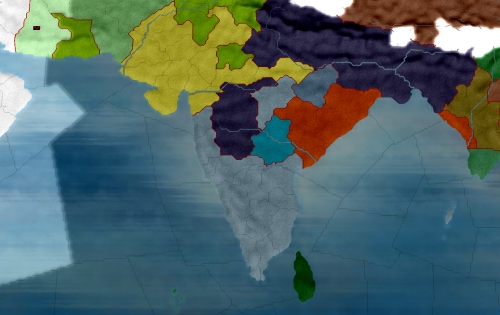
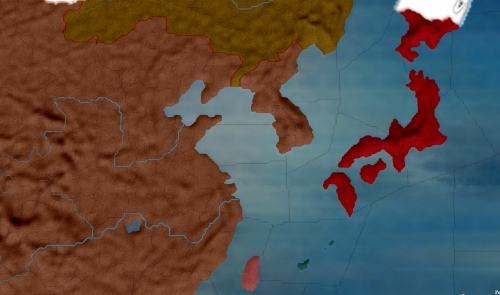
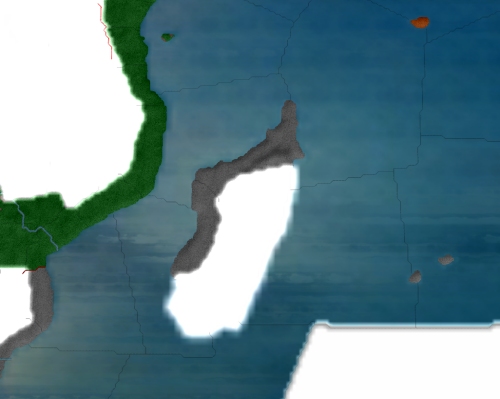
Despite being busy planning his vengeance against the Byzantines, King Baldwin X felt that Jerusalem, too, should be part of the colonial race. It would not be wise to let the Kingdom's access to the Indian Ocean be bottled off by Scotland or Leon.
The large island of Madagascar looked like a promising start. It was inhabited by hostile pagans, but that was nothing a little musket fire couldn't solve.
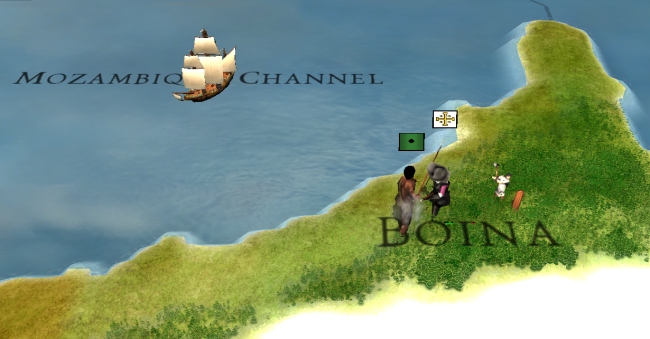
Soon small numbers of colonists began to make their way south to Madagascar and the two tiny islands to its east. Jerusalem's Red Sea navy was expanded and began to ferry troops and colonists back and forth to Madagascar. Unlike some of the colonization efforts in western Europe, which were often refugees or privately funded, Jerusalem's colonization effort was, while smaller, under the direct control of the state and envisioned as primarily a missionary endeavor, not one launched for profit.
Meanwhile, the Byzantines seemed willing to bury the hatchet, offering a royal marriage to Jerusalem. King Baldwin X flatly declined the offer. No son of his would marry a Byzantine whore.
Improvements were made to the quality of training for the Kingdom's troops. Furthermore a new kind of cavalry was added to the army, one which would hopefully be more effective then the old fashioned medieval knights that still rode alongside the Kingdom's musketmen.
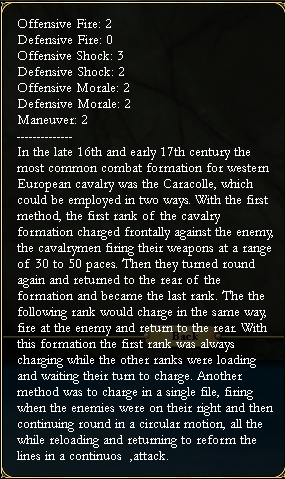
After ten years of festering resentment, Baldwin X finally felt he was ready in 1605. He massed his armies and declared war on Adana. The Byzantines, as expected, came to the aid of their tiny ally.
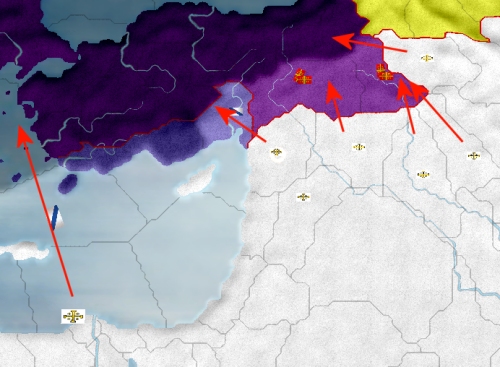
Things did not go as well as hoped. Massive Byzantine reinforcements flooded out of Anatolia, led by the Byzantine Emperor himself. Although Adana fell to Jerusalem's troops, the thrusts into Byzantium were hurled back by huge numbers of Greek troops.
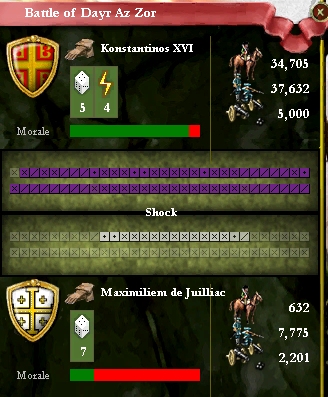
1606 was a year of bloody fighting, with border provinces changing hands multiple times and large clashes of armies. King Baldwin X desperately tried to push the Byzantines back with little success. He felt humiliated. This war was supposed to be an invasion of Byzantium, not a desperate, swirling, chaotic defense of Jerusalem's homeland.
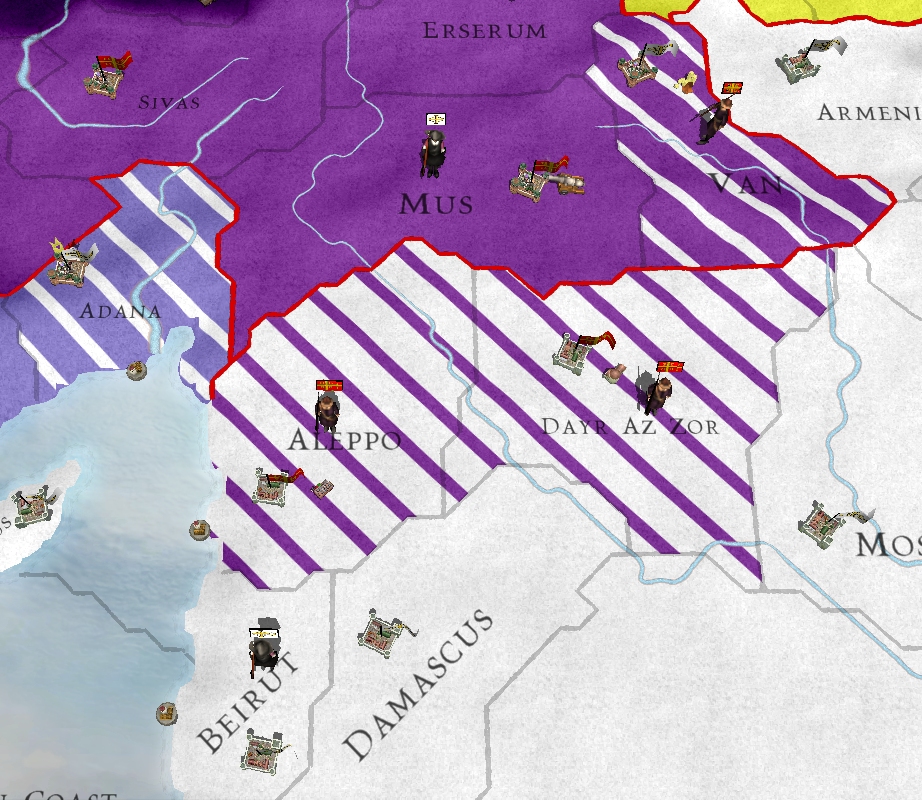
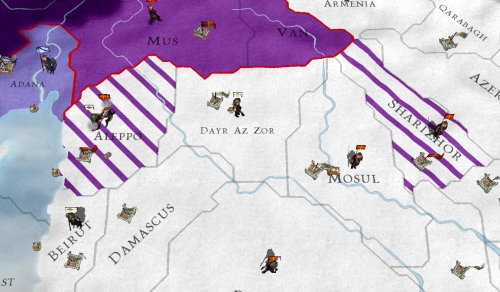
Once again Jerusalem's manpower began to run low. Reinforcements trickled to a standstill and Byzantine armies drove south, coming within sight of the walls of both Baghdad and Jerusalem.
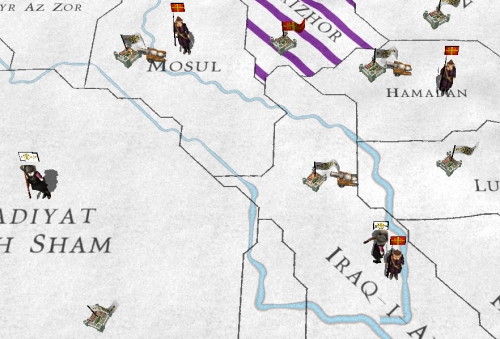
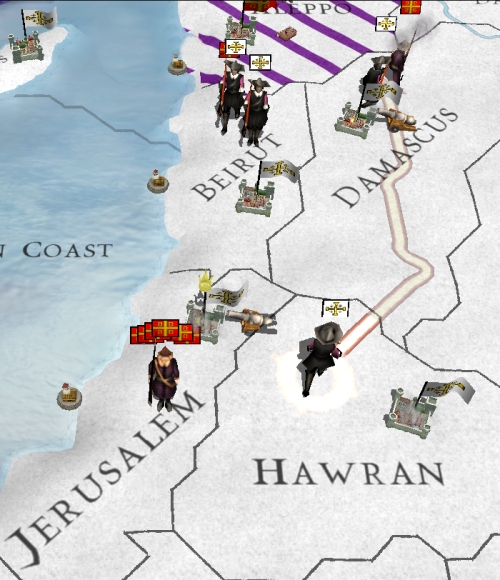
Baldwin X rushed back to the defense of his capital and drove off the Byzantine force. The Kingdom's reserves of manpower reached zero. Fresh Byzantine troops were still appearing on the border. Although he longed to keep fighting, the King finally saw the wisdom of his councilors and offered terms to the tune of 1000 gold in reparations, treasure, and trade concessions.
Like his father before him, he had been humiliated by the decadent Byzantines.
Perhaps the problem was that he hadn't focused enough on the heretics still within the borders of the Kingdom. After all, much of Persia remained Protestant. As Jerusalem slowly rebuilt its reserves and armies, King Baldwin X sent a large number of missionaries to Persia. If he could bring Persia back to the Catholic faith God might return his blessing to the Kingdom.
In the south, aggressive natives slaughtered the Kingdom's entire colony in southern Madagascar. Troops were pulled from Arabia to slaughter them all, and more colonists were sent to repopulate the ruins.
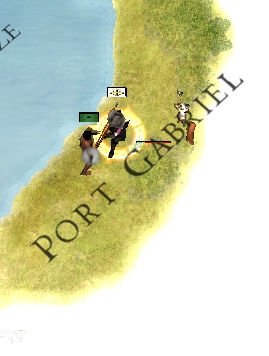
The other thorn in the side of the Kingdom was the tiny emirate of Yemen, which remained independent and surprisingly aggressive. Yemeni spies and bandits continued to harass Jerusalem, and King Baldwin decided that it was time to destroy them and unify Arabia. The Yemeni were still allied with the Muslim Indian nation of Gujarat. This time, Jerusalem would send an expeditionary force to humble them too. After the debacle of the Byzantine Invasion, the country could use a victorious war to lift her spirts. He attacked in the spring of 1611.
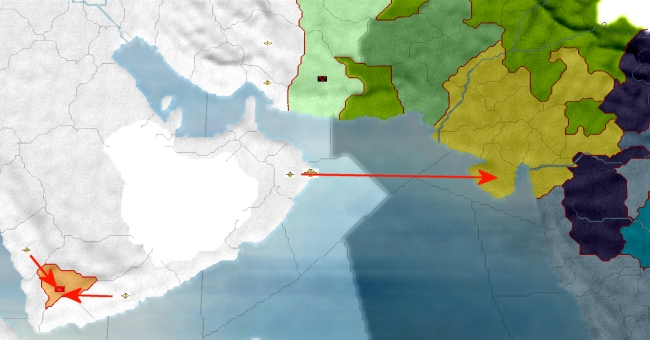
Within weeks the upstart Yemeni were crushed and annexed. The Emir was burned at the stake for his sins against the Church. Good news too, came from Persia as large numbers of Protestants began to return to the Catholic Church. There were a few revolts, certainly, but nothing the local garrison couldn't put down.
Jerusalem's forces landed at Kathiawar, and smashed local resistance. The fleet ferried more and more soldiers into Gujarat. By mid-1612 the Kingdom's troops, with Baldwin X at their head, were driving on the Gujarat capital.

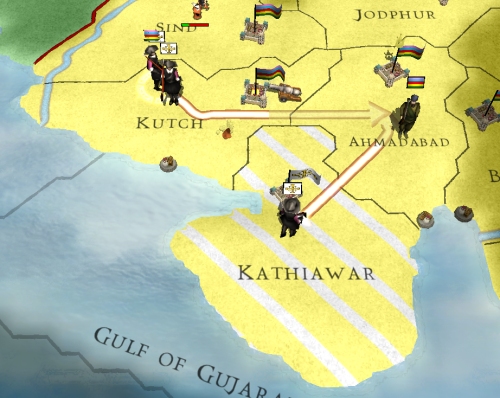
The Muslim Kingdom of Delhi joined in the fray and attacked Gujarat from the other direction. Assailed on all sides and vastly outnumbered, the local Sultan had no choice but to concede to his invaders. Jerusalem took a large swath of coast, including the important trading port of Kutch, while Delhi bisected what was left of the country.
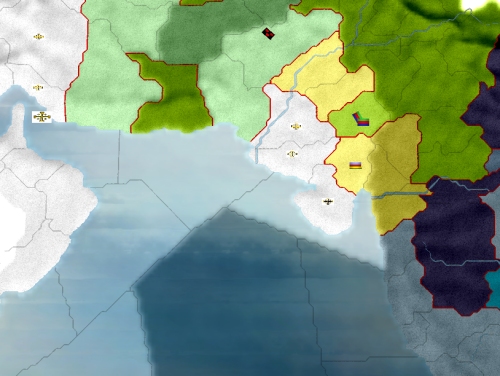
News came that the 'Aztecs' the strongest of the Nicholian pagan nations had recently annexed several other, weaker, tribes and now stretched to the Atlantic ocean. King Baldwin X could not understand why Leon and the Scots didn't attack these upstarts and bring them Christ, but they seemed happy to just trade with the pagans. Clearly not everyone was as devoted to the Faith. Baldwin X wrote a long letter to the King of the Scottish Union, advising an attack on the Aztecs, but got only a vague and non-committal response

Yes, everything green there is Aztecs. The black striped provinces are ones they don't have a core on.
In 1615, his dream of humiliating the Byzantines unfulfilled, King Baldwin X died, a lonely and depressed man. His conquests in the east had done nothing to assuage the pain he felt at failing to fulfill the oath he had sworn to his father.

His son, Baldwin XI, saw little need to trouble himself with the Byzantines. He turned his attention instead to the east. That was where the real wealth lay. His one regret, after taking the throne, was that his father had not lived another year, because in 1616, the missionaries Baldwin X had sent to India bore fruit, and all three conquered provinces converted to Catholicism. There was a celebration held in Jerusalem, and thanks was given in the High Cathedral that the locals had abandoned their cow gods and come to Christ.
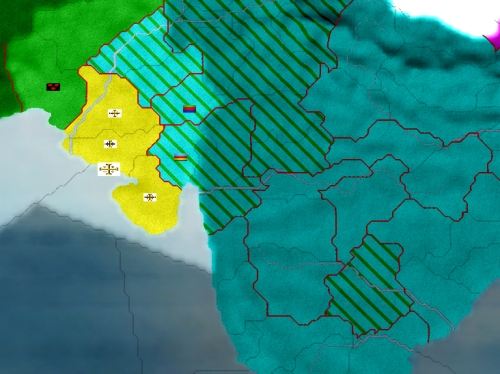
The first major act of Baldwin XI was to launch an invasion of the Maldives, a chain of islands that could be used to command the sea approach to Jerusalem's new enclave in India. The local chief put up negligible resistance and was quickly annexed. After the war, Jerusalem also founded a colony on the Horn of Africa.
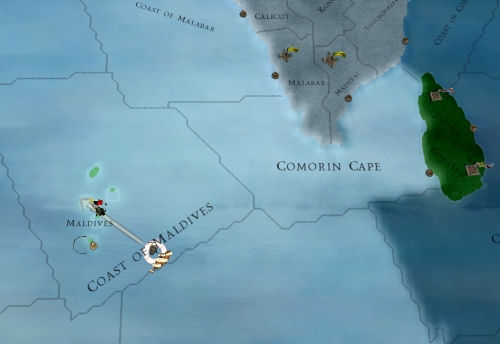

In 1618, New Bethlehem, the capital of Jerusalem's colonies in Madagascar became a full-fledged city, and the colonists began to assert real control over the island.

The Russian Rum, meanwhile, continued to fight both the Timurid and the Muslim nation of Delhi. Left unchecked, they would soon force their way to a port on the Indian Ocean. King Baldwin XI sought to forestall this, by attacking the Timurid himself and connecting Jerusalem's Gujarati holdings to the Kingdom proper. Despite the Kingdom's friendly relations with Rum, Baldwin XI did not want to see Christian India cut off by the Russians. Once they took any land their huge size and massive manpower would make it almost impossible to take it back.
So the King began to draw up plans for an invasion of the broken Timurid Empire. Jerusalem still had a large army in her conquered Gujarati territories, and it would move north while the Persian armies moved east.
King Baldwin XI was just getting ready to order his armies to the border when he was interrupted. He should, it seemed, have paid more attention to Byzantium after all. In August, of 1621, a hundred thousand troops from Byzantium and Adana flooded across the border into the Kingdom of Jerusalem.
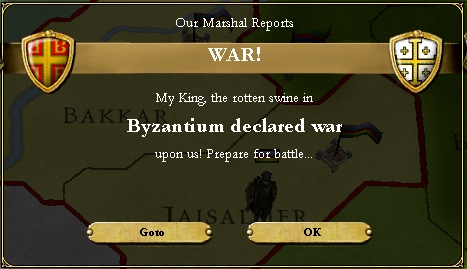
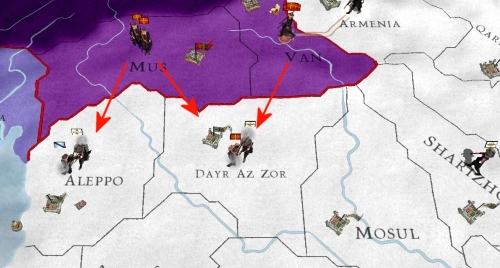
The King, who had been prepping his army to march east, charged north with his troops to relieve the attack on Aleppo, which had already suffered so much in previous wars. Just south of the city his troops were ambushed by the soldiers of Adana. King Baldwin XI led his troops in the vanguard, as his ancestors always had, sword held high. He wore his shining armor, embossed with a Jerusalem cross, and a golden crown upon his head. He caught a bullet in the heart and fell from his steed, killed instantly.
The Kingdom's army routed south to regroup at Beirut, and invaders flooded over the walls of Aleppo, capturing the city. Baldwin's son, Louis, took the throne amid rumors of an impending Byzantine attack on Jerusalem itself.
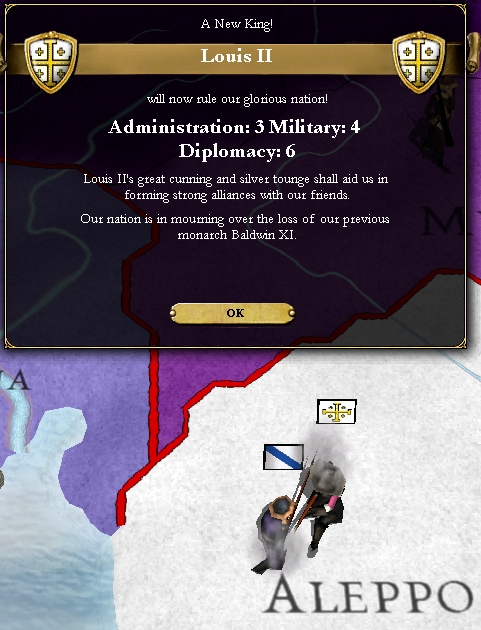
The city of Damascus, riled by Byzantine agents, and weary of constant war, revolted with 12,000 troops, who were quickly put down.
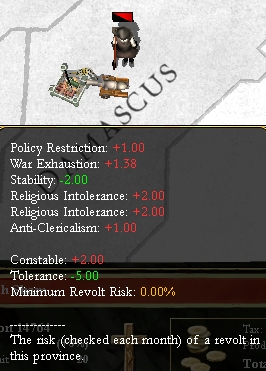
The fighting over the next few years was extremely fierce, and made the last war with Byzantium look almost idyllic. King Louis II was, in some respects, a far more practical man than his father, and did not take to the field in personal command of his troops. He knew himself well enough to know that he was no great military leader and would never live up to the exploits of him namesake, Saint Louis the Great. Instead he led from Jerusalem, and listened carefully to the advice of his generals.
Slowly, bit by bit, the Byzantine attack was reversed. The years of fighting had given Jerusalem a strong military tradition, and King Louis II recruited several brilliant leaders to carry the war in to the Byzantine homeland.
In 1624, the Kingdom reached her high tide mark of the war, having captured nearly a third of Anatolia, and forcing Adana out of the war.
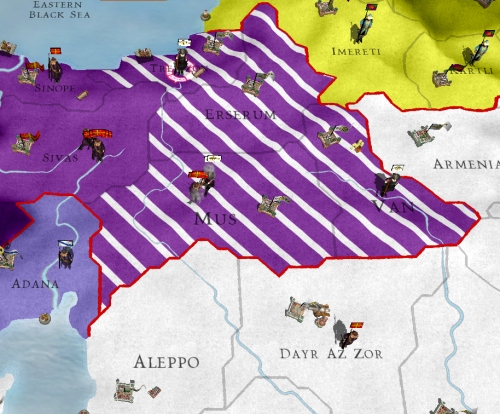
Unfortunately, the Kingdom's manpower was completely exhausted by this point, and even all the brilliant leaders in the world couldn't hold on to what had been conquered. Thirty of Jerusalem's divisions had been completely destroyed, and now the full might of the technologically superior Byzantines was pushing back against King Louis II's counter-invasion. In the summer of 1625, having been rolled most of the way back out of Anatolia, and after long consideration, he listened to the advice of his Generals and High Council and agreed to a white peace with the Byzantines, who had refused all attempts to force them to terms more favorable to Jerusalem. The Byzantine Empire simply was too rich and populous to easily triumph against.
No land had been gained, but the Byzantine invasion had been turned back and their homeland had known the torch and fury of Jerusalem's armies. It was Jerusalem's first victory against their northern neighbor since the brief Persian conflict nearly three hundred years before.
Once the peace had been settled, King Louis II took steps to make sure that Jerusalem would be able to carry out any future war to a more satisfactory conclusion. A law was passed that all men of good faith, character, and serviceable age would be required to serve in the Kingdom's armies for a period of several years. No distinction was made concerning wealth or nobility, all good Christians had a duty to defend Christ's Kingdom.
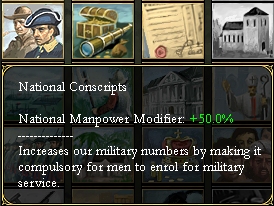
Within a year of the treaty being signed, Venice attacked Byzantium, and the Emperor's armies moved west into Hungary to defend her European frontiers.
King Louis II was no idealist. He was no dreamy-eyed poet nattering of chivalry and honor. King Louis II liked to win.
He massed his conscript armies and trained them harshly. The treaty of truce between Byzantium and Jerusalem expired in December of 1627. King Louis II attacked on the third of January, 1628.
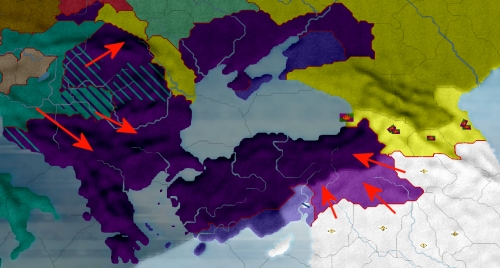
The vast bulk of the Byzantine army was engaged in Hungary, where the forces of Venice were slowly moving forward against them. The Emperor had only left a token force on his southern border, thinking Jerusalem too worn out by the last war to attack again so soon. Later, he would regret his overconfidence.
King Louis' armies smashed into Anatolia, assaulting every fortress they came upon. More importantly the Kingdom's fleet supported a landing force that raced to siege Constantinople. The Byzantine fleet, fighting in the Adriatic, arrived too late to stop the landing. Although Jerusalem's fleet was completely destroyed in the ensuring naval battle, the Kingdom's assault caught the nominal garrison in Constantinople by complete surprise and overwhelmed them.
Victory was at hand.

In the spring of 1629, Konstantinos XVII ceded the provinces of Mus and Van to the Kingdom of Jerusalem, greatly shortening the Kingdom's frontier.
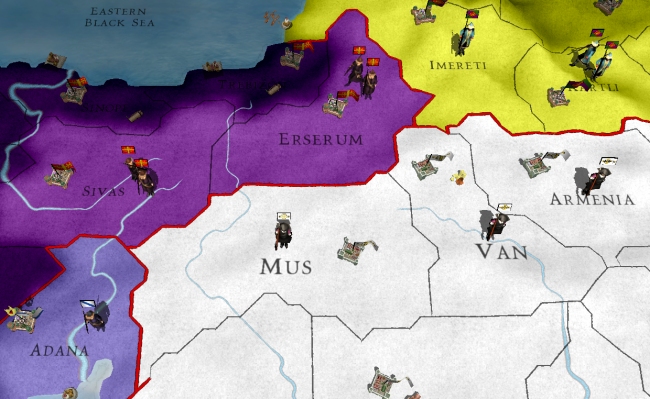
King Louis II was victorious and was known, ever after, as King Louis the Bold.
